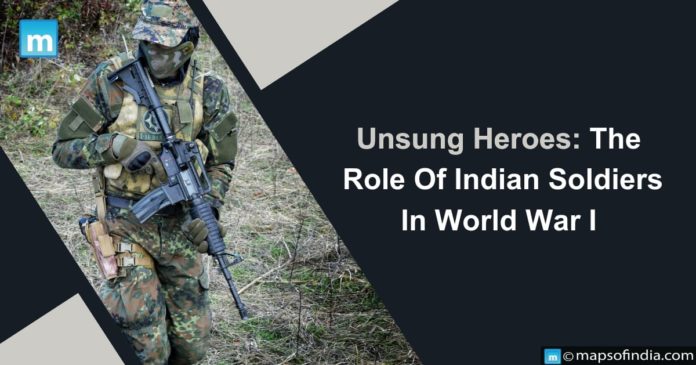World War I, also known as the “Great War”, was a global struggle involving nations worldwide. While the war is most usually associated with European nations, the contribution of Indian soldiers in World War I is an important but usually ignored chapter in history. More than a million Indian soldiers participated in various theaters of the war, not only contributing to the British war effort but also leaving an unmistakable stamp on history.
Recruitment and Deployment
When World War I broke out in 1914, the British Empire, of which India was an important part, needed more people. Indian soldiers were recruited, and volunteers from many origins, faiths, and areas of India joined the British Indian Army. Motivated by a sense of duty, economic considerations, or career opportunities, these soldiers were an essential part of the war effort.
The Western Front
Indian soldiers were dispatched to several regions of war, including a sizable contingent serving on Europe’s Western Front. They fought in historic conflicts such as the Battle of Neuve Chapelle, the Battle of Ypres, and the Battle of the Somme. Not only did the soldiers endure the physical obstacles of trench combat, but they also had to contend with the severe European environment, which was radically different from the conditions in their native country. Their bravery and fortitude were undeniable. They maintained the line against overwhelming German forces at Ypres, receiving the nickname “Lions of the Punjab.”
The Mesopotamian and Mediterranean Theaters War Efforts
Aside from the Western Front, Indian soldiers were important in Mesopotamia and the Mediterranean wars. They fought against the Ottoman Empire, contributing significantly to key battles such as the Siege of Kut-al-Amara and the Battle of Gallipoli. The Indian Expeditionary Force in Mesopotamia endured difficult conditions, such as excessive heat and limited resources, yet they persisted with tenacity.
Efforts Outside Battlefield
The contribution of our soldiers extended much beyond the battleground. Indian workmen created the roads, bridges, and railways that carried supplies to the frontlines. They worked as doctors, nurses, and stretcher-bearers, caring for the wounded and relieving suffering amid wartime pandemonium. Their dedication and expertise saved countless lives, earning their comrades’ esteem and affection.
Gallantry and Sacrifice
In the face of challenges, the Indian soldiers showed incredible bravery and fortitude. Despite discrimination and prejudice, they demonstrated their worth on the battlefield. Many received medals for their gallantry, including the Victoria Cross, the British Empire’s highest military accolade. However, the conflict came at a high cost. Over 62,000 Indian soldiers died on foreign land, and the broader story of the Western Front often overlooked their efforts. Their families, scattered across India, suffered the brunt of their grief, their lives forever altered by their loved ones’ absence.
How did World War 1 help Indians?
Despite their enormous contribution, Indian soldiers were subjected to discrimination and prejudice. They were denied equal pay and respect and were viewed as subjects rather than combatants. Their bravery, however, triumphed against these injustices. They fought not only for the British Empire but also for their families, communities, and the hope of a better future. The war was also a catalyst for transformation. The experience of fighting alongside warriors from various backgrounds helped Indians develop a feeling of togetherness and national awareness. It introduced them to new ideas and beliefs, sowing the seeds of independence that would bloom in the coming decades.




